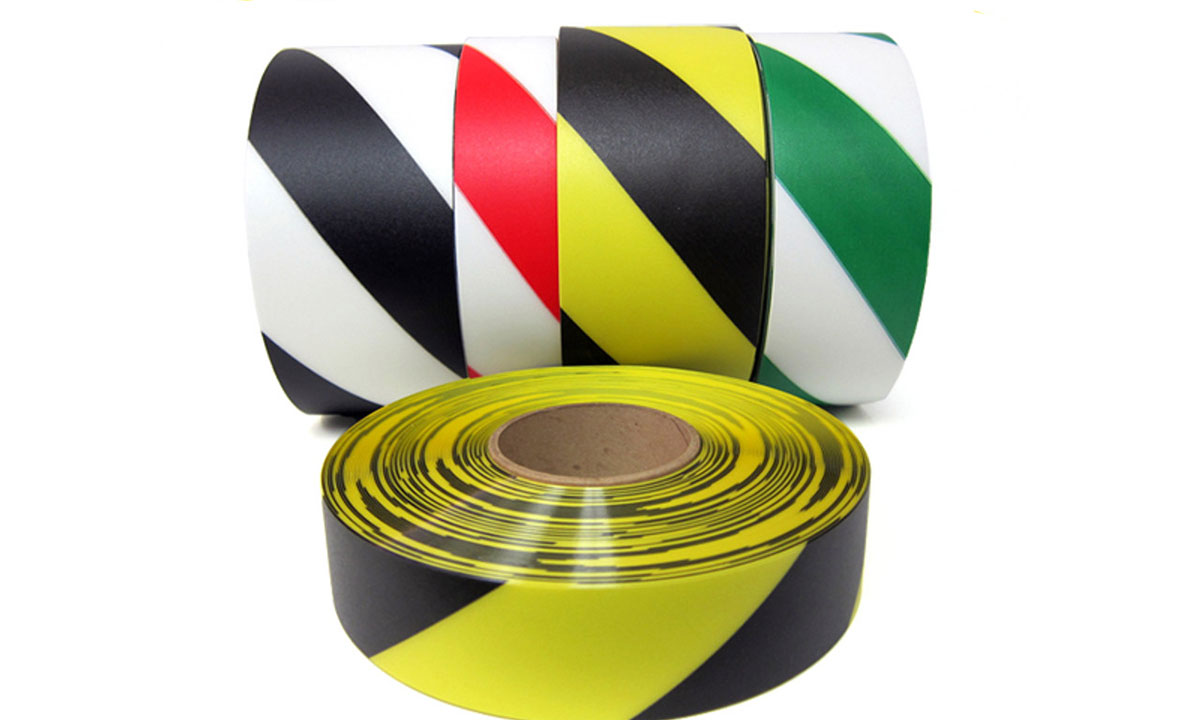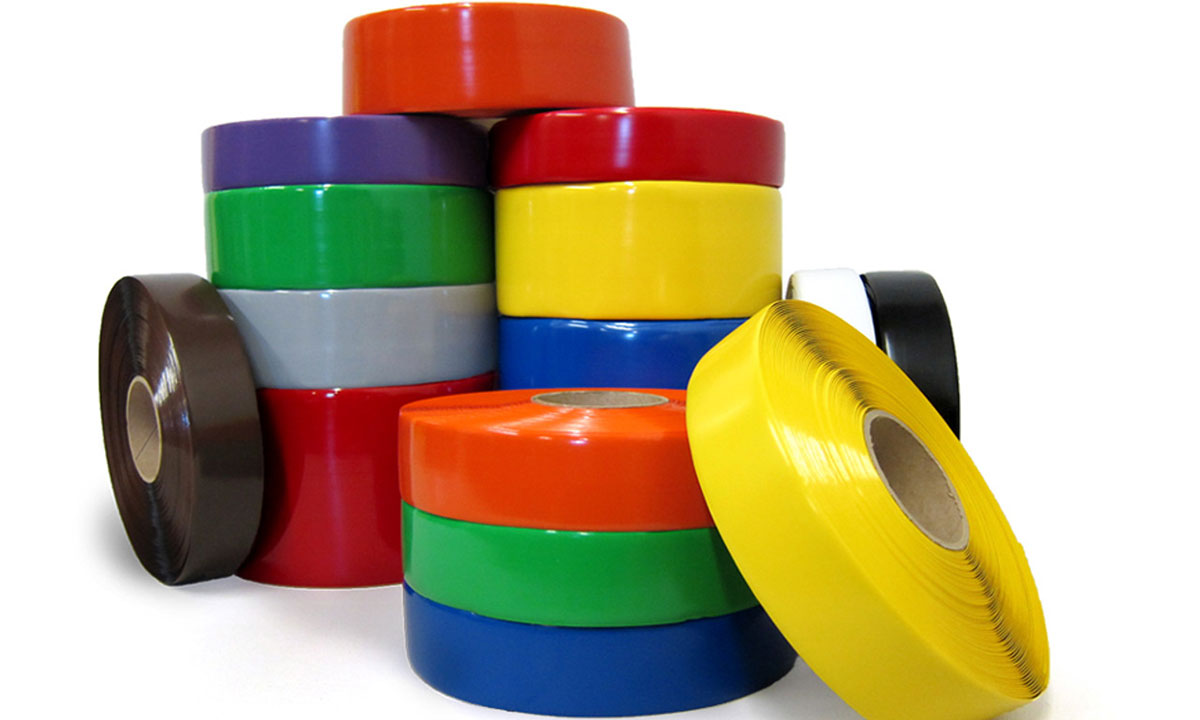Vinyl Tape and Why You Need It
Vinyl tape is a remarkably versatile and indispensable adhesive. This pliable yet sturdy tape is an excellent choice for numerous tasks.
Electrical tape is the most recognized variety, with insulating properties that make it ideal for safeguarding electrical connections and wires. However, the uses of vinyl tape extend far beyond electrical projects. It can label documents, mark boundaries, and even create vibrant designs.
Vinyl tape may be worthy for many projects, but selecting the appropriate adhesive type, thickness, and color can make all the difference when it comes to achieving optimal results.
What Is Vinyl Tape?
Vinyl tape is an adhesive tape made of polyvinyl chloride (PVC), which people love for its durability and flexibility. This tape adheres effortlessly to a wide range of surfaces, from sealing boxes to wrapping electrical wires. Vinyl tape securely sticks to most materials without the need for additional adhesives.
One of the tape's most impressive qualities is its durability and resistance. It holds up well in adverse conditions that render many other adhesives ineffective. It can handle extreme temperatures and is resilient against moisture and chemicals. It also resists the harmful effects of UV radiation from the sun. The color may fade, but the structural integrity and stickiness remain unaffected.
Flexibility is a hallmark of this tape. It can conform to irregular surfaces and contours to ensure a snug fit and a secure bond. Other types of tape require flat surfaces and have major issues with any sort of irregularity. In applications where other tapes might struggle to maintain their hold, vinyl tape doesn't falter.
It also removes fairly cleanly. Many tapes leave a sticky residue or may damage surfaces, but vinyl tape comes off easily. This is especially nice if you're using it for labeling or temporary markings and need to make sure it doesn't leave a mess.
Vinyl tape comes in many colors, making it great for marking various surfaces for safety reasons or to help with traffic flow, such as in retail or industrial settings. It allows for color-coded organization, quick visual identification, or creative design applications. It also comes in special striped versions with uniform color combinations to denote specific hazards or situations.
You could say vinyl tape is the Swiss Army knife of tapes. It's incredibly functional. Vinyl tape is often the solution when other tapes cannot handle the job.
For example, duct tape may seem like it can do everything, but it doesn't hold up well to rain and other weather. Vinyl tape is a much better choice for bad weather and won't break down. You can often find a vinyl tape that can handle whatever job you need it to do.
Types of Vinyl Tape
Vinyl tape comes in many forms and can be used for many applications:
- Industrial-grade vinyl tape uses a synthetic and rubber-blend adhesive. It is compliant with Occupational Safety and Health Administration (OSHA) standards. Its high visibility makes it ideal for marking hazards or outlining safe zones. It is also a great choice for aisle tape to mark areas in industrial settings and also works well for joining pipes or weatherizing around windows.
- General-purpose tape is not as thick as industrial-grade tape, but it still has a lot of versatility. Uses include everything from labeling and decorating to coding and crafting. It is a favorite for DIY projects because of how easy it is to use and how adaptable it is to different circumstances.
- Heavy-duty tape has a rubber adhesive. It is tough enough to withstand high foot traffic and harsh conditions. Plus, it comes in many colors, which makes it a good warning tape. It also can withstand a demanding environment, which means it is an ideal floor marking tape and can be an alternative to electroplating tape.
- Striped vinyl tape comes in universal, immediately recognizable color schemes. For instance, black and yellow for barricades, red and white for fire prevention, black and white for aisle marking, and green and white for first aid zones.
- Electrical tape is specifically for electrical applications. This type of vinyl tape can connect, insulate, seal, protect, and repair wires. Unlike many other tapes, it is fireproof and won't go up in smoke with the first hint of electrical sparks.
When choosing the right type of tape, you need to think of your needs and what qualities are important in that particular application. For example, go with heavy-duty vinyl tape if you need something to mark floors in a high-traffic area. It's durable enough to withstand the excessive wear it will likely see.
If you're doing something creative, like decorating a float for the annual 4th of July parade, general-purpose vinyl tape should work fine. It will withstand the elements and has plenty of color options to suit your desired aesthetic.
Advantages of Vinyl Tape
Vinyl tape is the top choice for many situations thanks to its many advantages. Some of the more important characteristics of vinyl tape include:
- Weather resistance: This tape is a reliable choice for both indoor and outdoor tasks. It can withstand extreme temperatures, moisture, sunlight, and chemical exposure without losing its adhesive properties or structural integrity. This gives it an edge over many other tapes on the market.
- Flexibility: Vinyl tape is incredibly flexible. Most tape is rather rigid and cannot conform well. Vinyl tape is the opposite. It bends so easily that it can work on almost any surface. This adaptability makes it suitable for many uses, from sealing joints and pipes to crafting and decorating.
- Easy application: This product adheres instantly and securely to most surfaces. It will stick to just about anything.
- Affordability: This tape provides high-quality performance at a budget-friendly price point. It isn't expensive at all and is readily available, so you can get what you need without breaking the bank.
- Writable surface: The ability to write on vinyl tape makes it a nice tool for labeling, marking, or providing instructions.
- Aesthetic appeal: Vinyl tape is available in a diverse range of colors and striped patterns. It works well for color coding or other situations where color is important.
- Durability: Vinyl tape doesn't degrade quickly or easily and maintains its adhesive properties and structural integrity over time. Its durability is a huge selling point and why it's so widely used across industries and DIY projects.

Tips for Proper Application & Removal
Even the strongest tape will fail if you don't apply it properly. The correct application ensures a secure bond and increases durability. Here are a few important tips to keep in mind before you get started:
- Ensure the surface is dry and free of dust, dirt, moisture, oil, or any residue that will diminish the tape's ability to stick.
- Avoid air bubbles and wrinkles by applying the tape slowly and smoothly. You can use a tool, such as a plastic squeegee or a credit card, to make the process easier.
- Use even pressure while smoothing to help increase adhesion.
- Double-check the positioning before firmly pressing the tape down to avoid misalignment.
After applying the tape, keep the surface clean and dry to prevent the buildup of dirt or contaminants that could induce early wear of the tape. Watch for signs of wear or damage, such as curling edges or rips, and replace the tape as needed to maintain its effectiveness.
For electrical applications, you will need to take some extra steps to be safe:
- Always follow basic safety rules when dealing with live wires.
- Only use vinyl tape on low-voltage bare wires.
- If wires require insulation, apply it before using the tape.
To apply electrical tape, stretch it out so it's about 75% of its original width. Wrap the tape in layers. Before finishing the last layer, let it return to its normal width. Always cut the tape instead of tearing it when you are done. This maintains the integrity of the last layer and ensures better adhesion to the wrapped part.
While vinyl tape is usually fire-resistant, you should still conduct regular inspections to watch for dried-out tape, which can be a hazard. You also want to watch for signs of wear and replace the tape promptly to prevent potential shock hazards.
Removing vinyl tape is fairly simple. You can add a little heat to make the process smooth and easy. It shouldn't leave too much residue, but if any remains, you can use alcohol to loosen it up.
Find the Right Vinyl Tape Today
Vinyl tape is a versatile adhesive solution. It is durable, flexible, and removes cleanly while resisting adverse conditions. Whether you need it for industrial, crafting, or electrical applications, this tape provides a secure and long-lasting bond.
Visit Tape Jungle for a comprehensive selection of vinyl tape products catering to diverse needs. From heavy-duty industrial tapes to vibrant tapes for creative projects, you'll find a tape that suits your requirements perfectly.
If you have any tape-related needs, don't hesitate to reach out to Tape Jungle's expert team, who is standing by to assist you. Whether you have a simple question or need help choosing the right product, the team has the answers.


 Canadian Dollar
Canadian Dollar
